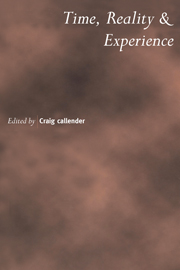Book contents
- Frontmatter
- Contents
- Preface
- Notes on Contributors
- When Time Gets Off Track
- Burbury's Last Case: The Mystery of the Entropic Arrow
- Zeno's Arrow and the Significance of the Present
- Presentism, Ontology and Temporal Experience
- A Presentist's Refutation of Mellor's McTaggart
- Time and Degrees of Existence: A Theory of ‘Degree Presentism’
- McTaggart and the Truth about Time
- On Absolute Becoming and the Myth of Passage
- Time Travel and Modern Physics
- Freedom from the Inside Out
- On Stages, Worms and Relativity
- On Becoming, Cosmic Time and Rotating Universes
- How Relativity Contradicts Presentism
- Can Physics Coherently Deny the Reality of Time?
- Rememberances, Mementos, and Time-Capsules
McTaggart and the Truth about Time
Published online by Cambridge University Press: 05 May 2010
- Frontmatter
- Contents
- Preface
- Notes on Contributors
- When Time Gets Off Track
- Burbury's Last Case: The Mystery of the Entropic Arrow
- Zeno's Arrow and the Significance of the Present
- Presentism, Ontology and Temporal Experience
- A Presentist's Refutation of Mellor's McTaggart
- Time and Degrees of Existence: A Theory of ‘Degree Presentism’
- McTaggart and the Truth about Time
- On Absolute Becoming and the Myth of Passage
- Time Travel and Modern Physics
- Freedom from the Inside Out
- On Stages, Worms and Relativity
- On Becoming, Cosmic Time and Rotating Universes
- How Relativity Contradicts Presentism
- Can Physics Coherently Deny the Reality of Time?
- Rememberances, Mementos, and Time-Capsules
Summary
Introduction
McTaggart famously argued that time is unreal. Today, almost no one agrees with his conclusion. But his argument remains the locus classicus for both the A-theory and the B-theory of time. I want to show how McTaggart's argument provided the impetus for both of these opposing views of the nature of time. I will also present and defend what I take to be the correct view of the nature of time.
McTaggart begins by noting that, when we think about when, in the temporal order of things, an event is located, there are two ways in which we can do this. On the one hand, we can locate an event as in either the past, the present, or the future. Once we have designated an event as occurring, say, three days ago, then every other event temporally related to that event will have some determinate location in either the past, the present, or the future. McTaggart called the series of events ordered in this way the A-series. But we can also locate events in time without reference to the past, present or future. We can locate events as temporally related to each other. We say that an event is earlier than, later than, or simultaneous with some other event. We can use these relations to order every event in a temporal series. McTaggart called the series of events generated in this way the B-series.
Information
- Type
- Chapter
- Information
- Time, Reality and Experience , pp. 137 - 152Publisher: Cambridge University PressPrint publication year: 2002
Accessibility standard: Unknown
Why this information is here
This section outlines the accessibility features of this content - including support for screen readers, full keyboard navigation and high-contrast display options. This may not be relevant for you.Accessibility Information
- 8
- Cited by
